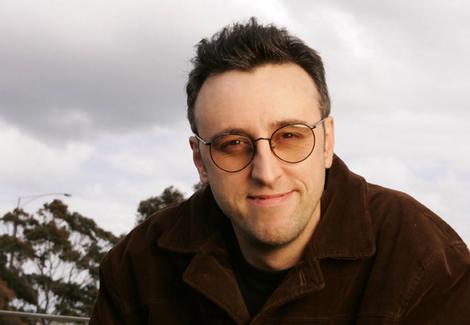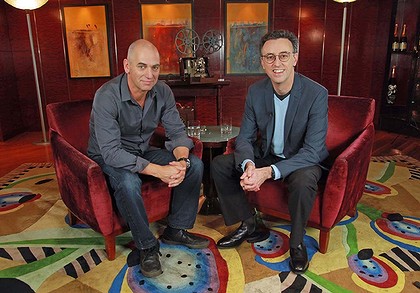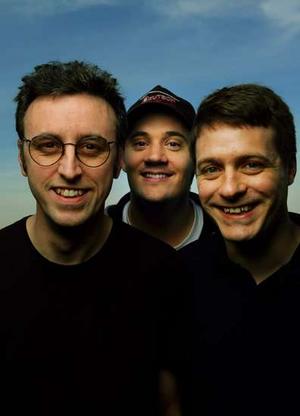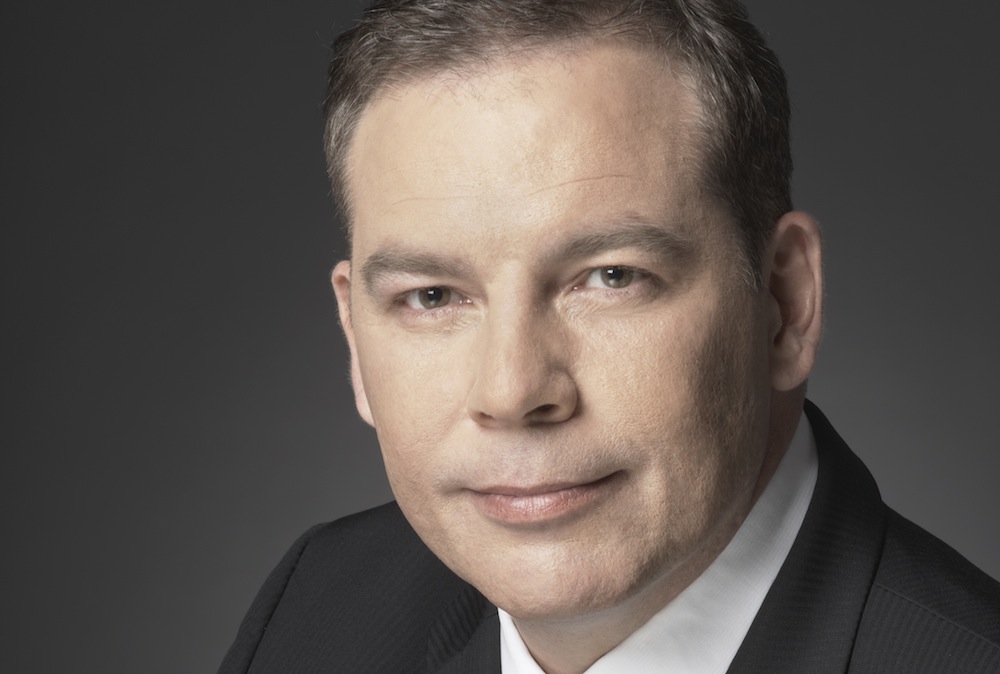Tony Martin Tuesdays (pt:1)

Welcome to Tony Martin Tuesdays.
Tony Martin and Scott Muller caught up recently for the first time since Scott was Tony and Mick’s sketch-making button-monkey on Martin-Molloy in the mid-1990s.
This is the first part of that interview.
This week Tony talks about the best television show ever filmed in a hotel foyer for no budget, why nowdays sketch comedy is considered “sooooo 2000s”, why he loves doing “Jetpack Shows” … and he also gives Marty Sheargold a quick, free plug.
Scott: I’ve told quite a few comedians and breakfast radio people to check out your ABC television series, “A Quiet Word With…” (a one-on-one interview show filmed in hotel foyers) – it’s a fascinating insight into the minds of some of the world’s great comedians and stars. Funny, too. Before we segue into radio, tell us about that show.
Tony: I think it’s the best show ever shot in the foyer of a hotel. Originally the timeslot was late nights on the ABC, where Artscape used to be. So the ratings expectations were non-existent. The idea was, rather than just interview whoever was in town, I would wait until there was someone I was a fan of so I wouldn’t have to fake (interest).
If you ever saw an interview with an artist on Artscape, they don’t talk about their kids, they talk about their paint brushes. I’d never seen a show like that about comedians, so that was the idea.
I did one show with (UK comedian) Bill Bailey, which got half a million viewers. Until then, the most that slot had ever got was about 300,000. And the one with Carrie Fisher was hugely popular, too. So then they wanted to move it to Saturday (with more potential viewers). And they dangled the carrot of doing a second series. On Tuesday nights it had been a big fish in a small pond, and on Saturdays it became a small fish in a big pond. Lesson learned!
Although that didn’t affect the shows themselves. For example, I did one with Rob Sitch.
 Scott: That one was fascinating…
Scott: That one was fascinating…
Tony: Yeah, for fans of comedy! (Note: apparently that one wasn’t a big ratings winner).
The shows were shot in a bar with the same (very small) crew as if you’d sent someone to a hotel room to do an interview – the thinking being that if we did it on a small scale then there wouldn’t be the pressure to ask the guest about the time they met Katy Perry!
So, because there was no money or pressure we were left to do what we wanted to do.
The cheaper you make something, the less pressure you’re under to make it for a mass audience. And because it was me, and the people I interviewed were funny, it ended up being entertaining – it would naturally be funny.
Scott: Do you think that principle applies to radio as well?
Tony: I guess. I mean, all four radio shows that I’ve done have had no other concern except being funny.
Even when we were doing the breakfast show (The D-Generation on Melbourne’s Triple M, 1986-1992), it was a four hour show originally, and it did nothing but sketches. We didn’t have any callers, it was all characters. No-one played themselves.
When Jane Kennedy joined that was when it became more popular because suddenly there was a real person! The show had no competitions apart from 'Dag Quiz', no callers – it was purely a comedy show. It was quite extraordinary. I think it was the novelty that made it work – it was all about comedy.
 There’s not much room on radio for something that’s purely comedy. I’m not saying there are no funny people – there are – people like Marty Sheargold. But (those types of shows) still have to do the business stuff.
There’s not much room on radio for something that’s purely comedy. I’m not saying there are no funny people – there are – people like Marty Sheargold. But (those types of shows) still have to do the business stuff.
And Martin-Molloy was just about “what made you laugh today”. Even the guests and callers were bent towards that end. Comedy was the only concern.
The thing about the shows I’ve done is that because I’d done virtually every job in radio before I did the comedy shows, I kind of knew what you could do. With Martin-Molloy, as long as the show was popular, we could pretty much do anything we wanted.
If you want to do comedy on commercial radio, you really have to learn the ropes. With Martin-Molloy, we didn’t have a “chaperone” (an anchor forced into the show). I always remember, years ago, hearing Jodie & Jo on Fox FM – and they had a male anchor. And I heard more of the male anchor than Jodie & Jo. (Tony does a blokey, anchor impersonation:) “Isn’t that right, girls?”
Not having an anchor worked on Martin-Molloy because I could do all of that stuff, and I didn’t mind being “the jock”.
Scott: There’s not much in the way of pure sketch shows on radio now…
Tony: Every decade I’ve done a show with sketches. In the ‘80s sketches were “sooo ‘70s”. In the ‘90s sketches were “sooo ‘80s”. And in the 2000s sketches were “sooo ‘90s” … etcetera. I think the word sketch has a bad connotation (with some management). I was told once, before pitching a show, “do not use the word sketch – it’ll be like saying the words ‘penny farthing’”.
What it comes down to, though, is sketches just take so fucking long. I would be up all night writing, and then spend three hours with the production guy on it.
Scott: Yes. I know.
Tony: I remember one took three days! And it ran one minute fifty! It just doesn’t seem like sensible behavior. But it’s so satisfying because you get to use all the bells and whistles and you get a lot of plays out of one great sketch.
 Sketches don’t have to be “man comes into a shop”. Sketches can be piss-takes of the station’s programming and promos.
Sketches don’t have to be “man comes into a shop”. Sketches can be piss-takes of the station’s programming and promos.
Then, with “Get This” I wanted it to be a lot looser – because Martin-Molloy was all scripted. “Get This” was planned in point form, leaving lots of room to go off on a tangent. And when it gets really messy and sounds like it’s off the rails, you want to suddenly go ‘Bang!’ – with a sketch that you’ve spent three days making.
So the contrast of going almost off the rails, then the show being redeemed with a sketch – going from extreme messiness to extreme organization – gives the listeners the feeling of “Oh, they knew what they were doing all along”.
To me the most important thing about a radio show is the tone – what’s the tone of the show? What can, or can’t, they do? And we used to call them ‘Jetpack Shows’. We could be sitting there talking to the Prime Minister quite seriously, then say “I have to put money in my meter” – and then there’d be the sound of a jetpack, an open window, the sound of me flying down into the car park, hearing an argument (with the parking inspector) way off in the background, then the sound of me flying back up into the studio and continuing the interview with the Prime Minister.
I always want to be able to do that. Because within that world (the imaginary world of the show), it’s all real. David Letterman used to do that really well. He would go “here’s what I did on the weekend” and cut to driving a monster truck into his house!
Read part 2 here
Read part 3 here
|
Scott Muller is Director of MBOS Consulting Group, a media management and consulting firm. |




